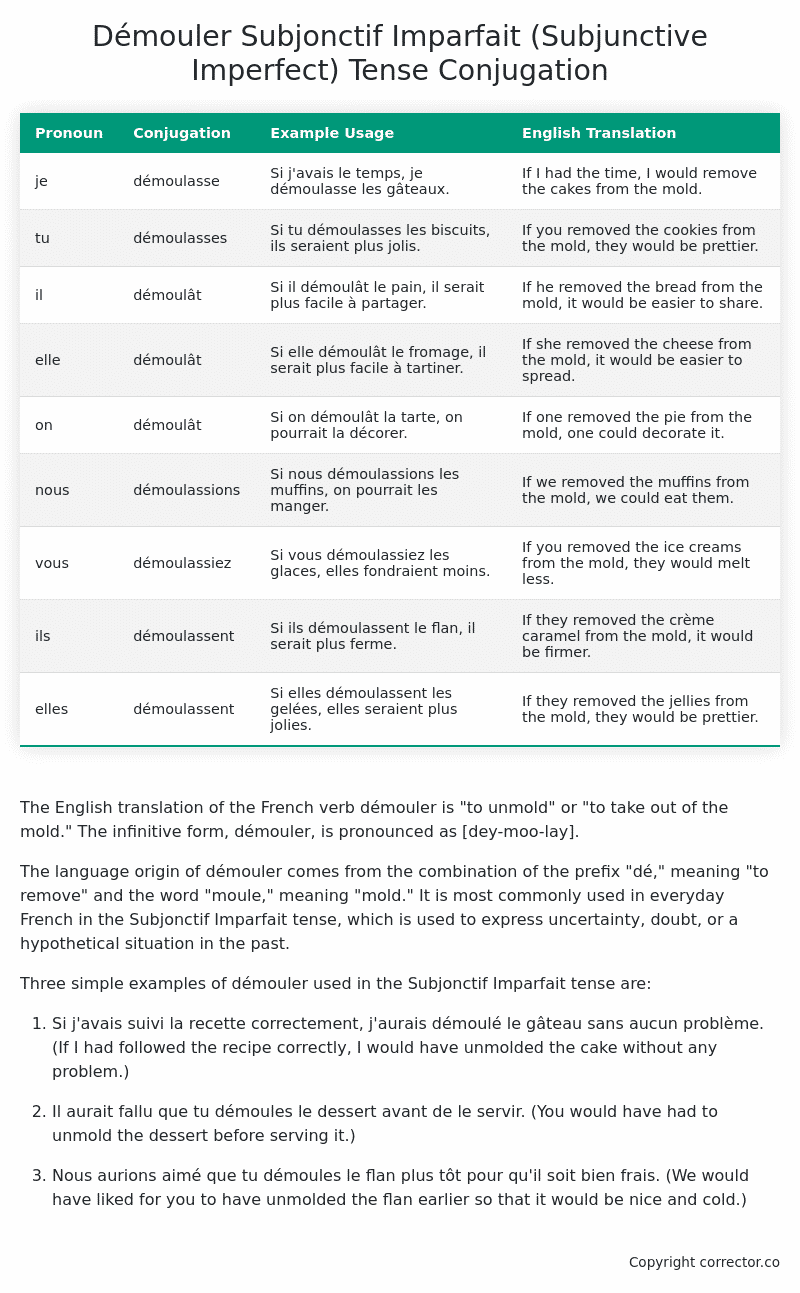Subjonctif Imparfait (Subjunctive Imperfect) Tense Conjugation of the French Verb démouler
Introduction to the verb démouler
The English translation of the French verb démouler is “to unmold” or “to take out of the mold.” The infinitive form, démouler, is pronounced as [dey-moo-lay].
The language origin of démouler comes from the combination of the prefix “dé,” meaning “to remove” and the word “moule,” meaning “mold.” It is most commonly used in everyday French in the Subjonctif Imparfait tense, which is used to express uncertainty, doubt, or a hypothetical situation in the past.
Three simple examples of démouler used in the Subjonctif Imparfait tense are:
-
Si j’avais suivi la recette correctement, j’aurais démoulé le gâteau sans aucun problème. (If I had followed the recipe correctly, I would have unmolded the cake without any problem.)
-
Il aurait fallu que tu démoules le dessert avant de le servir. (You would have had to unmold the dessert before serving it.)
-
Nous aurions aimé que tu démoules le flan plus tôt pour qu’il soit bien frais. (We would have liked for you to have unmolded the flan earlier so that it would be nice and cold.)
Table of the Subjonctif Imparfait (Subjunctive Imperfect) Tense Conjugation of démouler
| Pronoun | Conjugation | Example Usage | English Translation |
|---|---|---|---|
| je | démoulasse | Si j’avais le temps, je démoulasse les gâteaux. | If I had the time, I would remove the cakes from the mold. |
| tu | démoulasses | Si tu démoulasses les biscuits, ils seraient plus jolis. | If you removed the cookies from the mold, they would be prettier. |
| il | démoulât | Si il démoulât le pain, il serait plus facile à partager. | If he removed the bread from the mold, it would be easier to share. |
| elle | démoulât | Si elle démoulât le fromage, il serait plus facile à tartiner. | If she removed the cheese from the mold, it would be easier to spread. |
| on | démoulât | Si on démoulât la tarte, on pourrait la décorer. | If one removed the pie from the mold, one could decorate it. |
| nous | démoulassions | Si nous démoulassions les muffins, on pourrait les manger. | If we removed the muffins from the mold, we could eat them. |
| vous | démoulassiez | Si vous démoulassiez les glaces, elles fondraient moins. | If you removed the ice creams from the mold, they would melt less. |
| ils | démoulassent | Si ils démoulassent le flan, il serait plus ferme. | If they removed the crème caramel from the mold, it would be firmer. |
| elles | démoulassent | Si elles démoulassent les gelées, elles seraient plus jolies. | If they removed the jellies from the mold, they would be prettier. |
Other Conjugations for Démouler.
Le Present (Present Tense) Conjugation of the French Verb démouler
Imparfait (Imperfect) Tense Conjugation of the French Verb démouler
Passé Simple (Simple Past) Tense Conjugation of the French Verb démouler
Passé Composé (Present Perfect) Tense Conjugation of the French Verb démouler
Futur Simple (Simple Future) Tense Conjugation of the French Verb démouler
Futur Proche (Near Future) Tense Conjugation of the French Verb démouler
Plus-que-parfait (Pluperfect) Tense Conjugation of the French Verb démouler
Passé Antérieur (Past Anterior) Tense Conjugation of the French Verb démouler
Futur Antérieur (Future Anterior) Tense Conjugation of the French Verb démouler
Subjonctif Présent (Subjunctive Present) Tense Conjugation of the French Verb démouler
Subjonctif Passé (Subjunctive Past) Tense Conjugation of the French Verb démouler
Subjonctif Imparfait (Subjunctive Imperfect) Tense Conjugation of the French Verb démouler (this article)
Subjonctif Plus-que-parfait (Subjunctive Pluperfect) Tense Conjugation of the French Verb démouler
Conditionnel Présent (Conditional Present) Tense Conjugation of the French Verb démouler
Conditionnel Passé (Conditional Past) Tense Conjugation of the French Verb démouler
L’impératif Présent (Imperative Present) Tense Conjugation of the French Verb démouler
L’infinitif Présent (Infinitive Present) Tense Conjugation of the French Verb démouler
Struggling with French verbs or the language in general? Why not use our free French Grammar Checker – no registration required!
Get a FREE Download Study Sheet of this Conjugation 🔥
Simply right click the image below, click “save image” and get your free reference for the démouler Subjonctif Imparfait tense conjugation!

Démouler – About the French Subjonctif Imparfait (Subjunctive Imperfect) Tense
Formation
Common Everyday Usage Patterns
Interactions with Other Tenses
Subjonctif Présent
Indicatif Passé Composé
Conditional
Conditional Perfect
Summary
I hope you enjoyed this article on the verb démouler. Still in a learning mood? Check out another TOTALLY random French verb conjugation!


